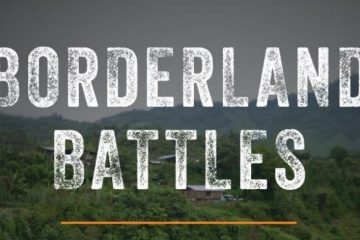OxPol is launching a new series in which contributors are invited to review recent books written by Oxford academics. This series hopes to encourage greater cross-divisional engagement of the Oxford graduate community with the work of the university’s top academics.

Borderland Battles: Violence, Crime and Governance at the Edges of Colombia’s War
Anette Idler summarizes some of the findings from her new book Borderland Battles, which reveals how violent non-state groups compete for territorial control, co-operate in illicit cross-border activities and replace the state in exerting governance functions in borderlands. Borderlands are like a magnifying glass on some of the most entrenched security challenges of the world. In unstable regions, border areas attract violent non-state groups ranging from rebels and paramilitaries to criminal organisations who exploit their neglect by central governments. These groups compete for territorial control, cooperate in illicit cross-border activities, and substitute for the governance functions usually associated with the state. Studying the Colombian borderlands where armed conflict and organised crime converge demonstrates that the gap between state-centric views on …

General election 2017: votes from anywhere
Some six months before Theresa May called a surprise general election, The Road to Somewhere was published. In it, David Goodhart argues that the old political divide, between left-wingers and right-wingers, has been superseded. The electorate, Goodhart claims, is now better divided between “anywheres” and “somewheres”. Peter Wiggins looks at the Goodhart argument in the context of the 2017 general election. Of “Anywheres”, “Somewheres” and “Inbetweeners” According to The Road to Somewhere, roughly 25% of the population are “anywheres” – they are mobile, metropolitan, liberal, tolerant, at home wherever they may be, and wary of group attachment. These voters are likely to be highly educated, and they tend to approve of “mass immigration,” subscribing, as Goodhart puts it, to “progressive …

Background Check on the UN
What is the United Nations? What does it do and how does it do what it does? Together with Sam Daws, Natalie Samarasinghe has recently co-edited a leading eight-volume reference text on the United Nations – The SAGE Major Work on the United Nations. It is dedicated to the structures and the role of the UN over the course of its history and at the present juncture. In this Q&A, Natalie Samarasinghe, Executive Director of the United Nations Association (UNA-UK), responds to the questions of Oxford graduate Genevieve Woods.

Democracy against the odds
Democracy in Africa: Successes, Failure and the Struggle for Political Reform testifies to the ability of African states to democratize against the odds. It effectively introduces a framework for understanding how leaders choose to respond to the pressure to liberalise their political systems, covering the recent history of African politics and providing great detail on the return of multiparty politics in Africa since the early 1990s. In this Q&A, Ian Cooper of the Department of Politics and International Studies (POLIS) at the University of Cambridge interviews Professor Nic Cheeseman, Associate Professor of African Politics, Jesus College, University of Oxford, on his recent publication.

International organisations on the loose? Sovereignty and international military operations
Dr Hylke Dijkstra has recently published a new book entitled International Organizations and Military Affairs (Routledge, 2016). This book represents the first comparative study of the politics behind the scenes at the United Nations, NATO and the European Union concerning the use of military force. It is also the result of a research project carried out at the DPIR in Oxford. DPhil candidate Dana Landau interviews him on the most pertinent questions that arise from his work.

Jonathan Wright responds to Jonathan Maynard’s Questions on Mental Maps
This review of Mental Maps in the Era of Détente and the End of the Cold War 1968-1991 is as much sweeping as it is detailed. Jonathan Wright highlights the main arguments each contributor has made to this edited volume dedicated to the thinking that prevailed during the closing decades of the Cold War. How did world leaders think? How did their thinking change and how did this impact the course of the Cold War? On behalf of his co-editor Steven Casey, as well as of each contributing author, Jonathan Wright makes the case that, “The great crises of the twentieth century sometimes allowed leaders even with very different ideologies to find something in common, a shared orientation in their mental maps.”


